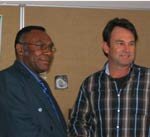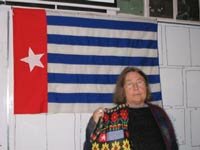22 November 2008
Aids epidemic in Papua alarms human rights advocates
19 August 2006
By Lauren Bartlett: Te Waha Nui Online
HIV/Aids is reaching alarming proportions in West Papua with health and human rights advocates sounding a warning.
Indonesian officials say that 2000 people in West Papua are affected, but coordinator John Wing of the Centre for Peace and Conflict Studies of Sydney University doubts this figure.
“It’s really just the tip of the iceberg,” he told a West Papua conference held at AUT University at the weekend.
United Nations other estimates put the true rate of HIV/Aids infection closer to 95,000.
Wing witnessed the epidemic first-hand last February, while visiting the Indonesian-governed island province, which borders Papua New Guinea.
He interviewed a woman who had been infected by her husband, who died soon afterwards, leaving her to look after her children alone.
Wing also visited a brothel in the southern town of Merauke, where eight women were infected with HIV. They had known so since 1997 but still continued to work as prostitutes.
“The Indonesian brothel owners get the women tested every six months, but when they find out they have it, they don’t do anything. They say it would be against the prostitutes’ human rights to stop them from making a living.”
Other human rights leaders are worried that the epidemic may drastically reduce the indigenous West Papuan population, and suggest that this is what Indonesia wants.
 |
Photo: Del Abcede
|
Forced family planning
Rev Socratez Sofyan Yoman, president of the Fellowship of West Papua Baptist Churches, believes that the Indonesian Government is trying to depopulate West Papua of its indigenous people, heavily promoting one or two child families, enforcing the family planning programme in West Papuan communities, but not immigrant Indonesian ones.
He says the government does not check immigrating prostitutes for HIV, and then allows them to work at nearby mines where West Papuan men are working.
Wing says the disease has now spread right to the furthest corners of West Papua, even the remote areas which take days overland to travel to.
“The military knows there is money to be made from incense similar to sandalwood. The native West Papuans know where to find it, and they are commonly paid with sex – the military facilitate the prostitutes getting to these remote corners.
The disease is also spread by the men leaving their villages to work in the logging and mining industry, then sleeping with infected prostitutes and returning to their wives.
“I asked the women if they used condoms when they are with there clients,” says Wing. “They say, ‘not always, sometimes the men are drunk, or don’t want to.’ ”
 |
Photo: Del Abcede
|
Dr Anne Noonan, an Australian medical practitioner, says a 2001 study found only eight per cent of rural West Papuans could identify a condom by sight.
“Women have to take responsibility to protect themselves, but this is difficult due to the conflict around family planning,” she says.
‘Aids could end the conflict’
The situation is different from Asia where HIV is predominantly passed through needles.
“If infection continues at this rate, forty per cent of the next generation will be infected with HIV,” Noonan says.
All of the speakers at the seminar on West Papua agreed that education programmes need to be set up as soon as possible, for the native population to survive.
“It could be Aids that ends the conflict in West Papua, not the military,” says Noonan.
Barry Coates, executive director of Oxfam New Zealand, says that the aid agency is aware of the problem and trying to help.
“We are putting a long-term programme in place that will hopefully be up and running by the end of the year.”
The charity can only operate in areas where the Indonesian military will allow them to.
Links:
- Genocide in West Papua?
- Low population in Papua an indication of genocide, according to a church leader
- Papuan religious leader spooked by Indonesian security officers
- West Papua conference programme
- BBC’s Rachel Harvey reports on Indonesian human rights abuses
- West Papua seminar news website
- West Papua website


